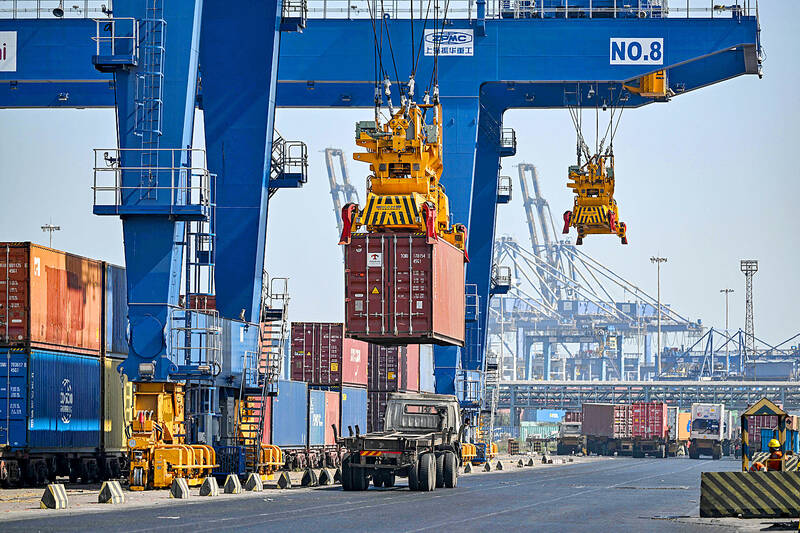India’s attempts at boosting its manufacturing sector by capitalizing on the US-China trade war have fallen short, with other Asian rivals benefiting to a much greater extent from escalating tensions between the world’s biggest economies, a study showed.
Between 2017 and last year, India’s total share in US imports rose by 0.6 percentage points to 2.7 percent while China’s portion dropped by about 8 percentage points to under 14 percent, Oxford Economics said.
The biggest beneficiary from the trade diversion in the region has been Vietnam, whose total share in US imports grew by 1.7 percentage points to 3.7 percent in the period.

Photo: AFP
Taiwan and South Korea have also made greater strides than India, increasing their share of US imports by 1 percentage point and 0.7 percentage points, respectively, according to Oxford.
The study underscores the uphill task facing Indian Prime Minister Narendra Modi as he attempts to boost the country’s lagging manufacturing sector, whose share of GDP has remained broadly stagnant at 17 percent for over a decade.
The research also implies that India might struggle to make significant gains if former US president Donald Trump returns as US president and follows through with a threat to impose a 60 percent tariff on Chinese goods.
“The US-China trade war so far has improved India’s export prospects only to a limited extent, dashing hopes that an escalation of the conflict could boost the lagging manufacturing sector,” Oxford Economics economist Alexandra Hermann wrote in a note. “India’s export strengths largely lie in sectors of the ‘old economy,’ where growth potential is limited and competition is fierce.”
India has made substantial advances in boosting electronic exports to the US, but its imports of components from China have surged as well, suggesting there is little value added to domestic manufacturing.
China accounted for about one-third of India’s imports of electronics, machinery, and chemicals and pharmaceuticals last year. For components such as certain semiconductor devices, as much as 67 percent of India’s imports came from China, Oxford said.

MULTIFACETED: A task force has analyzed possible scenarios and created responses to assist domestic industries in dealing with US tariffs, the economics minister said The Executive Yuan is tomorrow to announce countermeasures to US President Donald Trump’s planned reciprocal tariffs, although the details of the plan would not be made public until Monday next week, Minister of Economic Affairs J.W. Kuo (郭智輝) said yesterday. The Cabinet established an economic and trade task force in November last year to deal with US trade and tariff related issues, Kuo told reporters outside the legislature in Taipei. The task force has been analyzing and evaluating all kinds of scenarios to identify suitable responses and determine how best to assist domestic industries in managing the effects of Trump’s tariffs, he

TIGHT-LIPPED: UMC said it had no merger plans at the moment, after Nikkei Asia reported that the firm and GlobalFoundries were considering restarting merger talks United Microelectronics Corp (UMC, 聯電), the world’s No. 4 contract chipmaker, yesterday launched a new US$5 billion 12-inch chip factory in Singapore as part of its latest effort to diversify its manufacturing footprint amid growing geopolitical risks. The new factory, adjacent to UMC’s existing Singapore fab in the Pasir Res Wafer Fab Park, is scheduled to enter volume production next year, utilizing mature 22-nanometer and 28-nanometer process technologies, UMC said in a statement. The company plans to invest US$5 billion during the first phase of the new fab, which would have an installed capacity of 30,000 12-inch wafers per month, it said. The

Taiwan’s official purchasing managers’ index (PMI) last month rose 0.2 percentage points to 54.2, in a second consecutive month of expansion, thanks to front-loading demand intended to avoid potential US tariff hikes, the Chung-Hua Institution for Economic Research (CIER, 中華經濟研究院) said yesterday. While short-term demand appeared robust, uncertainties rose due to US President Donald Trump’s unpredictable trade policy, CIER president Lien Hsien-ming (連賢明) told a news conference in Taipei. Taiwan’s economy this year would be characterized by high-level fluctuations and the volatility would be wilder than most expect, Lien said Demand for electronics, particularly semiconductors, continues to benefit from US technology giants’ effort

‘SWASTICAR’: Tesla CEO Elon Musk’s close association with Donald Trump has prompted opponents to brand him a ‘Nazi’ and resulted in a dramatic drop in sales Demonstrators descended on Tesla Inc dealerships across the US, and in Europe and Canada on Saturday to protest company chief Elon Musk, who has amassed extraordinary power as a top adviser to US President Donald Trump. Waving signs with messages such as “Musk is stealing our money” and “Reclaim our country,” the protests largely took place peacefully following fiery episodes of vandalism on Tesla vehicles, dealerships and other facilities in recent weeks that US officials have denounced as terrorism. Hundreds rallied on Saturday outside the Tesla dealership in Manhattan. Some blasted Musk, the world’s richest man, while others demanded the shuttering of his